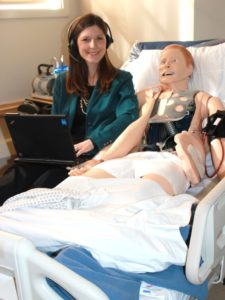Ribbon cutting/open house set for new BBCC medical simulation lab
The grand opening for a new medical simulation lab that uses manikins enhanced with technology to provide lifelike training for health care professionals will be held April 7, with a ribbon cutting set for 12:45 p.m. in the Health Education Building (Building 1700).

Big Bend plans to offer the first Medical Simulation Technician program in the state community and technical college system, said BBCC President Terry Leas. Program development and construction of the new medical simulation lab is funded by a $3.2 million Title V federal grant. The simulation lab is located in the Health Education Building (1700) in space that was formerly used as classroom space before the renovation last fall.

After completing the program approval process, Big Bend will offer a Medical Simulation Associate Degree in Applied Science—a transfer degree that prepares students for industrial certification and entry-level employment in simulation labs. Medical simulation technicians learn to design, implement, and troubleshoot scenarios to support the education of health care professionals. Students entering the program will be able to move into areas of computer science, STEM fields, and health care.
The BBCC Medical Simulation Advisory committee assembled to guide development of the program is comprised of people working in engineering, health care, computer science, and as first responders. The committee has been meeting for about 18 months to monitor the remodel process and curriculum development to ensure that the program meets industry standards.
BBCC and Samaritan Healthcare staff visited simulation labs at the University of Washington Medical Center, Seattle University at Swedish Cherry Hill Medical Center, and the Northwest Hospital and Medical Center to gain feedback for development of the space and the program.
Large hospitals use simulation training for more than 30 health care professions—from anesthesiology to urology. Simulations are tailored to meet each profession’s learning and training goals—which is why technicians and scenario programmers are in demand. BBCC simulation training will also be available to first responders, law enforcement, community healthcare workers, and educators, said Andrea Elliott, Medical Simulation Coordinator for Title V. “There is a shortage of Simulation Technicians at large hospitals,” said Elliott. “There is huge interest in and support for our program from education, healthcare, law enforcement, and emergency response officials.” The annual salary of medical simulation technicians can be up to $60,000.
BBCC intends to purchase three simulators at nearly $100,000 each with the Title V grant funds to support the new program. “Human medical simulators bleed, have pulse points, have a heartbeat, have seizures, overdose, have allergic reactions to medication, and they are fun,” said Elliott.
Simulation can give students the advantage of learning skills through repetition, and then improving those skills by increasing the difficulty and complexity of scenarios. Simulators bridge the gap between theory and clinical experience, Elliott said. By providing the opportunity to experience low-frequency conditions in a controlled environment, nursing research suggests that simulation can potentially be used to supplement up to 50% of clinical education.

